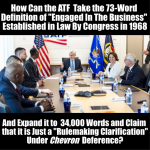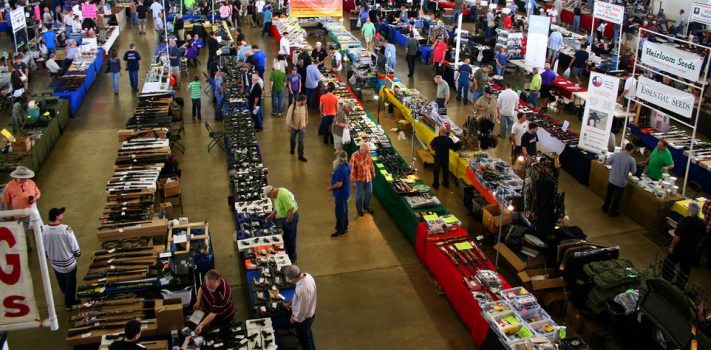The ATF’s new re-definition of “Engaged in the Business” of selling firearms is expected to go into effect on or about May 15th. The ATF’s Final Rulemaking was announced on April 8, 2024. Ignoring the weight of public comment, and ignoring logic, this new set of rules (see text at the ATF website) could make advertising and selling just one gun at a profit without a FFL a felony criminal offense. Even worse, it shifts the burden of proof from the government to individuals. In effect, you will be assumed to be guilty unless you can prove that you made no profit. Given the ongoing onslaught of currency inflation, just breaking even after allowing for inflation could be deemed a “profit”.
This new rule, which is 466-pages long, stems from the passage of the Bipartisan Safer Communities Act (BSCA), which broadened the definition of when someone is considered “engaged in the business”. Creepy Joe Biden signed this law on June 25, 2022. By abusing Chevron deference, the ATF’s minions then created this 466-page monstrosity, to wildly extrapolate just 73 words from the 1968 Gun Control Act into this lengthy set of rules.
There are some vague exemptions in the rule that redefine the term “personal collection” to clarify when people are not “engaged in the business” because they make only occasional sales to enhance a personal collection or for a hobby. But the rule also calls out exceptions to those exemptions. Fo example, the new rule transforms “occasional” into just one sale at a profit, to qualify for prosecution under a Federal felony! The ATF has warned: Willfully engaging in the business of dealing in firearms without a license is subject to a term of imprisonment of up to five years, a fine of up to $250,000, or both. They want to make everyone fearful of prosecution, and bow to their will.
Again, the burden of proof will shift from the government to individuals, to establish if the modern firearms they “occasionally” sell are part of a personal collection, and whether those sales are not intended to make a profit, but rather just to improve a collection.
The government use vague and ambiguous definitions where it suits them (like refusing to assign any number or frequency to the term “occasional”), but elsewhere in their rules they come down hard, with strict and picky definitions, to their advantage.
Absurdly, the word “sale” is redefined by the new rule, to include bartering between residents of the same state.
Even more absurdly, the ruling fabricates from thin air several new standards of “evidence” of criminal intent, none of which were mentioned in congressional legislation, such as:
Repetitively selling guns “…that are of the same or similar kind (i.e., make/manufacturer, model,
caliber/gauge, and action) and type…” — as proof of intent to be “engaged in the business”.
or,
Keeping a gun less than 30 days before reselling it — as proof of intent to be “engaged in the business”.
or,
including a factory box (“…persons who repetitively sell firearms in new condition or in like-new
condition in their original packaging…”) — as proof of intent to be “engaged in the business”.
or,
Keeping records of original cost versus sales price — as proof of intent to be “engaged in the business”.
The ATF rule includes this phrase: “…makes and maintains records to document, track, or calculate profits and losses from firearms repetitively purchased for resale.” It bears mention that keeping records is often needed for tax or insurance purposes, but the ATF sees this as further evidence of someone’s intent to be “engaged in the business”
Elsewhere in the same 466-page-long set of rules, we learn that a lack of original purchase cost records would make it almost impossible to prove that you didn’t later re-sell any particular gun at a higher price. Thus, it is a case of: “You are damned if you do, and damned if you don’t.” So, from a practical standpoint, what are we expected to do? A.) Not keep records, but then be unable to document that we weren’t seeking a profit, or B.) Hide our cost basis records, and only reveal them if we are later charged with being “engaged in the business” without a license, to prove our innocence? This all flies in the face of the time-honored “innocent until proven guilty” principle in American jurisprudence.
Sadly, the DOJ’s comment period for the proposed rulemaking has come and gone, and this new set of rules may stand, even if the Supreme Court does away with Chevron deference, with the upcoming Loper Bright Enterprises v. Raimondo case. We will simply have to live with it, most likely for several years.
intrastate Versus interstate
By their very nature private party sales through local classified ads or at gun shows are intrastate (within a state) commerce. Buyers, sellers, and merchandise do not cross state lines. The Federal government only has constitutional authority to regulate interstate commerce. By effectively banning private party sales between residents of the same state, this new rule is a gross overreach of Federal authority. The ATF claims that they have authority because intrastate somehow magically “affect interstate commerce. I spelled out their illogical nonsense in a recent SurvivalBlog article, titled: Fencing In Federal Jurisdiction.
Pre-1899 Guns Are Exempt
Thankfully, pre-1899 antique guns and blackpowder replica guns are exempt from the new rules. Per the Gun Control Act of 1968, any gun with a frame or receiver made on or before December 31, 1898 is not considered a “firearm”, regardless of its chambering, ignition system, or configuration. With the exceptions of only short-barreled cartridge rifles or shotguns, or full-auto guns (per the National Firearms Act of 1934) all other “antiques” are outside of Federal jurisdiction. Note, however, that some state and local laws apply. Needless, to say, after this rule goes into effect I expect to see some brisk sales of my pre-1899 antiques and percussion black powder replicas, at Elk Creek Company. I invested in a big vault full of the right guns!
The Clock Is Ticking!
I’ve warned SurvivalBlog readers about this upcoming rule for more than four years. (See: Preparing for a Private Gun Transfer Ban, posted in January 2019, and Some Very Bad Law: The ATF’s New “Engaged In The Business” Rule, posted in September 2023.) I hope that my readers bought what they needed for their collections, quietly. (Read: Sans papiers.)
 Some advice for those of you who live in any of the 34 “free” (private party sales) states: You now have less than a month to buy any private party guns or lowers that you want, to round out your collection. The clock is ticking. Do your purchasing while it is still legal, and while there are still some willing sellers. After the rule goes into effect, most people will be frightened into compliance, and nearly all sales of modern (post-1898) guns will be shifted to FFL channels — which means filling out an ATF Form 4473, and submitting to an FBI background check. Gun shows as we now know them in the 34 free states will become a thing of the past. The selection of guns offered privately will become pitifully small. There will be just a handful, and your chance of finding a particular model variant will become almost nonexistent, unless you submit to the Federal paperwork and background check.
Some advice for those of you who live in any of the 34 “free” (private party sales) states: You now have less than a month to buy any private party guns or lowers that you want, to round out your collection. The clock is ticking. Do your purchasing while it is still legal, and while there are still some willing sellers. After the rule goes into effect, most people will be frightened into compliance, and nearly all sales of modern (post-1898) guns will be shifted to FFL channels — which means filling out an ATF Form 4473, and submitting to an FBI background check. Gun shows as we now know them in the 34 free states will become a thing of the past. The selection of guns offered privately will become pitifully small. There will be just a handful, and your chance of finding a particular model variant will become almost nonexistent, unless you submit to the Federal paperwork and background check.
Bottom line: Unless this rule is suspended or overthrown by the courts, by June of 2024, all gun shows will resemble California gun shows, where any modern guns get transferred only through Federally-licensed “transfer dealers.” This deeply saddens and troubles me. Another nail has been added to the coffin of American liberty.
P.S. : A reminder that there were 15 shameless U.S. Senators with a “(R)” after their names who voted for the BSCA bill. They knew that this bill would end private sales of used guns. They were:
- Roy Blunt, Missouri
- Richard Burr, North Carolina
- Shelley Moore Capito, West Virginia
- Bill Cassidy. Louisiana
- Susan Collins, Maine
- John Cornyn, Texas
- Joni Ernst, Iowa
- Lindsey Graham, South Carolina
- Mitch McConnell, Kentucky
- Lisa Murkowski, Alaska
- Rob Portman, Ohio
- Mitt Romney, Utah
- Thom Tillis, North Carolina
- Pat Toomey, Pennsylvania
- Todd Young, Indiana










